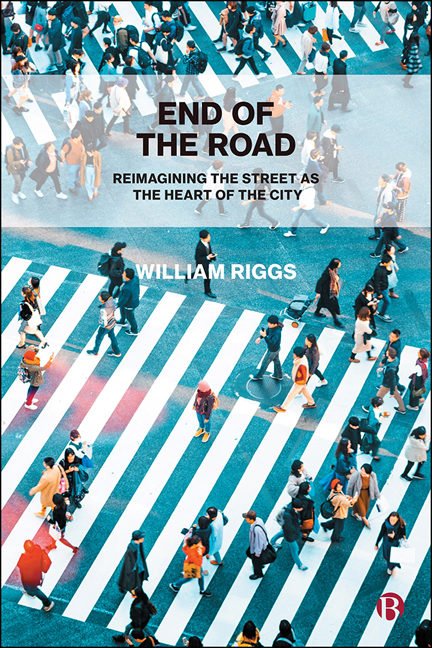Book contents
- Frontmatter
- Dedication
- Contents
- List of Figures and Tables
- Acknowledgments
- 1 Introduction
- 2 A Recent History of the Street
- 3 The Street for Transport
- 4 The Street as Economic Space
- 5 The Street as Social Space
- 6 The Street as Cultural Space
- 7 The Street as a Natural Space
- 8 Challenges to Ending the Road
- 9 Beyond Streets: Integrating Behavior
- 10 A Window into the Future: New Vehicles, New Streets
- 11 A Call to Action: Streets as the Heart of the City
- Appendix
- Notes
- References
- Index
3 - The Street for Transport
Published online by Cambridge University Press: 12 October 2022
- Frontmatter
- Dedication
- Contents
- List of Figures and Tables
- Acknowledgments
- 1 Introduction
- 2 A Recent History of the Street
- 3 The Street for Transport
- 4 The Street as Economic Space
- 5 The Street as Social Space
- 6 The Street as Cultural Space
- 7 The Street as a Natural Space
- 8 Challenges to Ending the Road
- 9 Beyond Streets: Integrating Behavior
- 10 A Window into the Future: New Vehicles, New Streets
- 11 A Call to Action: Streets as the Heart of the City
- Appendix
- Notes
- References
- Index
Summary
… as you see, the cars look out for the cyclists, the cyclists look out for the pedestrians, and everyone looks out for each other. You can’t expect traffic signs and street markings to encourage that sort of behavior. You have to build it into the design of the road. (Hans Monderman in McNichol, 2004)
Now that we have spent some time looking at the history of how “streets” developed into our modern iteration of “the road,” we can entertain a dialogue about how roadway (and related infrastructure) are currently designed by planners. As Hans Monderman says, this does not need to be an overwhelmingly technical conversation. The discussion can and should include aspects of the street that facilitate the type of activity we want to see, whether it be driving, walking, biking, taking transit or riding a scooter. The dialogue need not just be about engineering details.
For me, this departure from engineering is an act of catharsis, since the topic can sometimes be wieldy and complex, so much so that for the first five to six years that I worked as a professional I downplayed my expertise in transport planning and engineering. I was embarrassed (and perhaps slightly intimidated) by all the terminology and code, lingo and acronyms that city planners and transportation-folk threw around. I liked to joke that I should have written a dictionary entitled “transportation-speak.” I was not exactly dumb— I had both a master’s and PhD in the field— but it seemed that the terms were created to keep people in the dark. So, all I wanted to do was disengage from the pretense and go back to my spreadsheets.
Why spreadsheets? In 2002, I was hired as an engineering technician and asset manager by the Coast Guard, primarily because of my economic expertise and ability to develop complex life cycle and benefit cost analysis models. While I had expertise in streetscape engineering and design, particularly for walking and biking, I chose to underemphasize it since I was not confident in the technical language. However, confident or not, I came to understand that this high-minded language did a disservice to the community of transportation professionals, alienating key audiences.
- Type
- Chapter
- Information
- End of the RoadReimagining the Street as the Heart of the City, pp. 28 - 47Publisher: Bristol University PressPrint publication year: 2022



